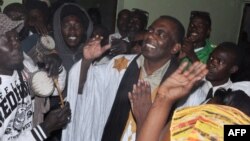A group of Mauritanian anti-slavery activists who were sentenced to up to 15 years in prison are appealing, but fear a system they believe is rigged against them.
On August 19, a tribunal in the capital city of Nouakchott found 13 members of the group Resurgence of the Abolitionist Movement (IRA) guilty of charges including being part of an unauthorized organization and inciting attacks against authority.
The charges stem from riots near the capital where police tried to evict unauthorized residents living in a shantytown. The evictions turned violent, and authorities blamed activists for the Haratin ethnic group which was being evicted. The Haratin, a darker-skinned ethnic group, has been historically discriminated against in Mauritania.
The convicted activists want to take their case to a higher court, but are concerned about fairness. Amnesty International representative Kine Fatim Diop said the government plans to transfer the case to a court in Nouadhibou, about 500 kilometers from Nouakchott.
"They will be far from their families, far from their lawyers. They will be at risk of mistreatment, and it will be something very difficult for the detainees," Diop said. "It's something that shows that this trial is politically motivated." The anti-slavery activists were not taken from the site where the riots took place on June 29 during the arrests but were rounded up from their homes and work. "It's a new attempt to intimidate and silence human rights defenders. The authorities in Mauritania usually arrest human rights defenders but especially those working on slavery in Mauritania," Diop said.
Tortured?
The IRA alleges its members in detention have been victims of torture, including having their hands and feet bound, being hung upside down for hours and being beaten on the bottom of their feet. This was done in order to extract confessions, said Siikam Sy a member of the board of directors of IRA-USA. "They have a prefabricated statement that they wanted them to sign, and those individuals refused to sign because they were not true," said Sy. IRA-USA is the U.S. chapter of the anti-slavery organization.
The events have attracted the attention of the U.S. Department of State, which said it was dismayed by accusations of torture. "The United States strongly encourages Mauritania to respect human rights and fundamental freedoms, including freedoms of expression and association, for all Mauritanians," the department said in a statement. "We support fair trial guarantees, transparent and credible judicial processes, and respect for the human rights of all individuals. We will carefully follow an anticipated appeal process."
In a coincidence of timing, the arrests occurred while the group's president and vice-president were in Washington D.C. being presented with the Trafficking in Persons Heroes Award by U.S. Secretary of State John Kerry.
Ahmed Ely, a lawyer representing the imprisoned IRA members in Mauritania, said they will appeal, but he does not hold out hope for a fair trial. "The Mauritanian justice system is not independent at all. The justice does what the political authority tells them to do," he said. "That's what happened in the trial that was just completed."
The Mauritanian government established the National Mechanism for the Prevention of Torture in April. This investigative body was set up to examine places where there is lack of freedom, but its committee members were denied access from visiting the anti-slavery prisoners. Sy said it was during the 11 days after the activists were arrested and held incommunicado that they were tortured. VOA made several attempts to reach the embassy of Mauritania in Washington D.C. for comments but didn't get a response.
Slavery is against the law in Mauritania, but the practice persists with families forced into servitude for generations.
Arzouma Kompaore contributed to the report.




